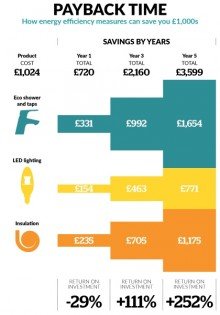TOP TIPS ON ENERGY SAVING
Do you worry about utility bills? At this time of year, when the lure of Christmas parties and present shopping attack your funds, it can be easy to forget about the household budget in all the stress. But shorter, colder days mean more need for lighting, heating, even water when the family are staying over Christmas.
SaveMoneyCutCarbon.com predict that something as simple as swapping to eco showerheads and taps could save a typical three-bed house a massive £895.32 per year. Sealing out the wind around doors and windows could save anything up to £50 a year from the heating bill; making sure devices are not left plugged in or idle, a typical home could save £50-80 a year. Is this something you are thinking about or arte you distracted by the twinkling Christmas lights?
Tip 1: Install LED lighting
Replace all the inefficient traditional lighting in your home with LED lights. You can get LED replacements for just about every fitting and installing LED lights delivers up to 90% savings on lighting bills. The initial cost is repaid in under a year through these energy savings and then you go on saving £154.17 per year in a typical 3 bed house and the LED lights last well over a decade.
Tip 2: Swap to eco showerheads and taps
Cutting back on the amount of water you use is another great way to save. Swap out your old shower heads with an eco version that mixes air with water flow and so cuts water consumption by more than 50% saving a typical 3 bed house a massive £895.32 per year. You can achieve similar savings with eco taps that also mix air and water or if you want to keep your current taps, simple but brilliant tap aerators again reduce water use by more than 50%.
Tip 3: Make sure you’re draught proof
It’s crucial to draught-proof your home. Sealing out the wind around doors and windows could save anything up to £50 a year from the heating bill, for example. Less cold air coming in should allow you to turn down the thermostat for further savings.
Tip 4: Insulate the loft
Insulate the loft, a cheap and effective way to cut costs and you get your money back though energy savings in about two years. You can save £140 a year from your bill. Investment in installation costs around £285 giving you payback in 2 years.
Tip 5: Get wall cavity insulation
If your home is less than 90 years old, then it’s likely that you can install cavity wall insulation, which sits in the space between two layers of bricks and is a very efficient way to cut heat loss, with payback on investment of around £500 in less than four years. Insulated walls can save you £95 off your bills, with installation cost at around £220 payback comes within 2-3 years.
Tip 6: Service or replace your boiler
Service or replace your boiler. If you do decide to get a new, more efficient model, you could cut energy use by up to 40%. A condensing boiler in place of an old model should cut gas bills by around £310 a year, which means that the investment is recouped in roughly six years.
Tip 7: Turn the thermostat down by 1 degree
Checking the timer programming, your radiator settings and turn down the thermostat by a degree to save about £75 off the annual heating costs or 14% energy savings per year.
Tip 8: Choose A-Rated appliances
Latest energy-saving appliances are all much more efficient than those of even five years ago and can help cut between £40-£100 each year from electricity bills.
Tip 9: Buy smart power strips and avoid standby
Get smart power strips. These switch off power to devices in a sequence – so if you turn off your PC/laptop, linked devices like the monitor, printer and scanner also power down. It’s the same for your TV, cable/satellite box, video game console and DVD player. v
Tip 10: Switch energy supplier to competitive green supplier
Switch energy supplier and keep flexible about who you buy energy from – if you can go for one of the competitive green energy suppliers you can save up to £200 per year. (Source: Citizens Advice Bureau)
Suzi Dixon







